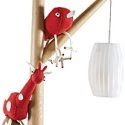
I recently ran across this article in a lovely magazine called Birth of a Mother and though I'd share it with you for this week's CrocTalk. Birth of a Mother's February/March issue was dedicated to what they call Constructive Consumerism, that is, the importance of making your shopping choices matter. The editor-in-chief Leah Chevalier writes about the importance of buying local and supporting businesses that support your personal ideologies rather than running to the closest mass-made-in-China retailer. We think this is an important initiative since rarely do people stop and think about where they shop, not just what they buy.
"I try to make purchasing decisions based on our family needs as opposed to wants. When weighing decision, I try and look at the amount of packaging things come with and yes, whether it is recyclable or not. Tough to do at Christmas time when it seems every toy comes super glued to shrink wrapped plastic and kryptonite twist ties. Yes, sometimes we buy individually wrapped treats or bars but we try to buy most food items in bulk and skip by the fast-food single size servings. My kids are sent to school with stainless steel water bottles, (I wish they would make the effort to get them back to the kitchen sink so I can avoid rummaging in the abyss of their scary backpacks), and we are trying to even reduce our paper towel use by using old cotton clothing recycled into rags. We try to eat local first, then organic and sustainable, and we are eating less meat (hard sell to a European, French husband!). Obviously there are evenings where a drive-by, fast food infraction is mandatory due to piano, guitar and drum lessons all being at the same time. But overall, living in Calgary means that most people live within a 5-9 minute drive from a mini or maxi-power retail center. This makes it ultra easy to support local business and reduce mileage between you and your shopping. As a consumer, I try and look beyond the comfort and ecological radius. I look at WHO I am supporting with my hard earned dollars. Does your favourite store give back to the community? Do they support local causes like Children's Hospitals, Shelters, Food Programs? What are they doing to ensure that they reduce their commercial, carbon footprint? Are they recycling their mountain of cardboard or filling landfills with waste? Are they at least trying to make a difference? It may not seem like much, but every little detail makes a huge impact. If 100,000 people in every large city stopped supporting mass-made-in-Cina retailers and supported local, eco-responsible, Canadian business. Imagine how that would impact the community; that city, the entire country. It would mean potentially saving hundreds of local jobs, a larger budget for local philanthropic work; larger donations to local charities; extra funds for homeless and shelter programs, and better waste reduction and eco-advancements. In the end, you chose where your money goes and who deserves to have it. By keeping your spending local, it just might bring a better selection and improved business practices to you favourite store all the while supporting the ever important eco-initiatives for our planet! So shop wisely!"
FEB/MAR 2008



